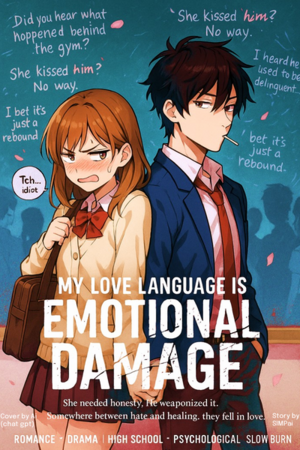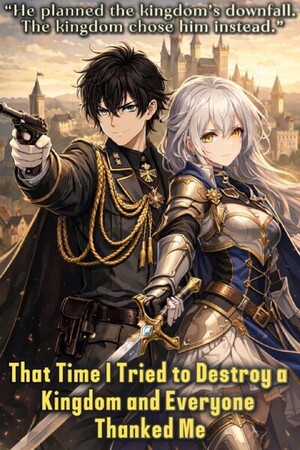Chapter 10:
One Sigh Over a Parsley Nest
Under the Lilac Bush
The long weekend was just around the corner, and the weather was dreadful — as if on cue, it was pouring rain.
"Not that bad," Akemi said, poking her nose out from under the blanket.
“Nope, scratch that,” she immediately countered herself. “I need to go.”
***
Ivan was insanely happy that he’d managed to finish his report on time. All that was left was to survive the work Monday. The gas cylinders were supposed to be delivered today, and then...
“After us, the deluge, right?” Ivan looked down at the puddle at his feet. Oh well. It wasn't far to walk.
***
Rodrigo was glad he didn’t have to be at class until the second period, so he made no comments about the rain outside and stayed sound asleep.
***
Thomas was already in the lab. The door swung open —Akemi folded up her umbrella, shook off the water, and hung it on a hook.
“Nice coat, looks good on you,” Thomas remarked.
Rain had become a rare event lately. Akemi herself was glad for the chance to walk a little under the grey-green sky that brought a moist coolness instead of the usual stifling heat. That’s why she was twenty minutes late — but there was no one around to scold her for it.
“Shall we finish the third part?” Akemi ignored the compliment, dragged over the nearest chair, and sat beside him.
***
Reinhardt was carefully examining the lilac bush in his garden. He pulled the hood of his raincoat down over his forehead.
“What are you?” he muttered. “You don’t wilt, you don’t die — you just... hold on somehow. It’s easier to breathe around you.”
Tai Ming had never given him that cutting — he decided to replant it and see what happened.
Reinhardt decided to run his own experiment too. He went to get his shears and carefully cut two branches —the strongest and healthiest, in his opinion. One he placed in water, the other in a pot with a pre-mixed blend of peat and sand.
He returned to the shed and placed the jar and the pot on the sunny windowsill. Though there was no sun at all for now.
***
Ivan got a solid “2” on his presentation. In the German grading system, that meant “good.” Of course, they didn’t actually assign numeric grades after seminar presentations — they were no longer in high school. It was more of a personal self-assessment. He gave a solid talk, answered the questions confidently, then sat back down and the seminar continued with a routine discussion of the pre-read texts. The post-presentation adrenaline faded quickly, and a wave of sleepiness hit him. Stifling yawns, he made it through the seminar, listened to the assignment for next week, and as soon as they were dismissed, he dashed outside — it felt fresher out there, especially in the rain.
***
As evening approached, Reinhardt was getting ready to cook dinner. The day had been unusually cool, and the rain had watered the garden for him. He’d done the laundry, cleared up some things over the phone with the insurance company, read a bit, even napped for about forty minutes — there was absolutely nothing left to do, so he went down to the kitchen. He opened the fridge. There was still enough meat — guess that’d be dinner. He opened the freezer — there were still a few bags of frozen vegetables, but he was trying to ration those.
He glanced back at the garden — his own tomatoes had long since died. He’d burned the remains and turned over the bed to prevent the blight from spreading. The rain hadn’t stopped. He put on his boots, pulled on his raincoat, stepped out, shut the door, and walked down the street.
At the far end of Hochberg lived a good acquaintance of his — a successful architect who had built a house according to the own project. Brutally cubic, it stood out among the classic German houses with sloped roofs and brown tiles. Reinhardt knew he could always count on some kind of exchange — he himself had often brought his neghboor fresh apples, strawberries, and tomatoes back when the “rotten plague” hadn’t yet hit the town. That’s how neighborly friendship worked.
He rang the doorbell. Alfred — the architect — opened and let him in.
“Sorry, came empty-handed today,” Reinhardt said.
“Oh, come on — you’ve seen the prices for vegetables lately?” Alfred adjusted his hood. Looked like he’d also been doing something outside. “I’ve just got a bit of greens. How about a drink? It’s been a while.”
Reinhardt nodded. Lightning struck the church spire nearby, and seconds later, thunder cracked the sky.
“Come in,” Alfred clapped him on the back, and they went inside.
Reinhardt wiped his boots on the mat, took off his raincoat, and looked around.
“Where’s Maria?”
“She’s still in Düsseldorf for two more days,” Alfred replied, pulling a bottle of cognac from the cupboard. “Not offering dinner, but…”
Reinhardt waved it off gratefully.
“Won’t stay long.”
Alfred rummaged in the fridge, took out some cheese, a bar of dark chocolate, set them on the table, and poured two shots.
They drank. Reinhardt had a bite to eat.
“By the way,” Alfred got up, “got something to go with the cheese.”
He picked up scissors from the table and walked to the windowsill. Reinhardt noticed some seedlings and followed him, curious.
Alfred carefully clipped some leaves.
“Still growing something?” Reinhardt asked, surprised, nodding at the seedlings.
“Just little stuff — parsley and basil. Everything outside’s dying. Whatever survived, we brought in — barely holding up... Mostly Maria’s work. I just help a bit.”
“Seems to be doing okay,” Reinhardt gently touched a sprout.
“Enough for seasoning.”
Reinhardt bent over a parsley sprout, exhaled slowly, then waved some of the air from the plant toward himself and inhaled.
“Well, yeah… doesn’t beat dill, of course,” he straightened up. “By the way, got any dill?”
“Only dried.”
“Ah, never mind.”
They went back to the table. Alfred finely chopped the basil and parsley and sprinkled it over the cheese. They poured another round. Thunder rumbled again outside.
***
The next round of pulse oximeter checks was done. Ivan exhaled and checked the time — 7:15 p.m. He didn’t feel like cooking, so he decided to grab dinner at the cafeteria while it was still open. Dodging between raindrops, he made it to the main building and quickly walked to the dining hall. They’d stopped serving hot meals for the day, so he grabbed a couple slices of mushroom and ham pizza, some reheated chicken soup from the lunch leftovers, a cup of coffee, and looked for a free table.
At that hour, the cafeteria was almost empty. Lots of seats were free. Ivan was heading to one when someone waved at him from the side. He looked closer — it was Professor Moldor, the one he had presented to earlier that morning during the seminar on Derrida and his idea of “différance.”
“Is this seat taken?”
“Not at all,” the professor replied. Ivan set his tray down and sat across from her.
“About...” Moldor began.
“I was just…” Ivan said at the same time.
They both started and laughed awkwardly.
“Go ahead,” Ivan said.
“About your presentation today — I didn’t have time to say after the seminar — it was good, but there’s room to develop it. Are you planning to write the paper or just take the credit?”
Ivan nodded in understanding. In their university’s MA seminar system, you could either do a short presentation and write a brief essay to get a pass, or write a full research paper — about 20 pages — and earn double the credits. Derrida, of course, was no easy figure with all his philosophy, but Ivan had a feeling he could manage a proper paper on him.
“I think I will. I’ll write the paper.”
“Good,” Moldor said. “It’s up to you, of course, but I’m glad to hear it — the topic still feels underexplored.”
“Well, I was limited by the seminar assignment…”
“Not your fault,” she waved it off, wiping her lips with a napkin. “You can’t cover all of Derrida in fifteen minutes. Not even in an hour. But if you’re writing, feel free to ask questions. You have my email?”
Ivan nodded, chewing on his pizza.
“If you want a more detailed consultation, I hold office hours Thursdays from 1 to 2 PM, room E5-116. Just email the secretary ahead of time for an appointment.”
Ivan nodded again, still chewing.
“And actually…” he swallowed a bite and quickly sipped his soup, “the presentation itself…”
Moldor looked at him, puzzled.
“I get really embarrassed about my German.”
She gave a nervous giggle, quickly disguising it with a light cough.
“No worries,” the professor said. “This isn’t a language course. Your presentation was clear, and you answered the questions well.”
Ivan was genuinely pleased to hear that from someone impartial.
“Want to hear a joke?”
“Wait, what?” Ivan nearly spat out his soup.
“Well… okay.”
“So — Moldor tried to sound casual — Franz Kafka, Jean-Paul Sartre, and Jacques Derrida walk into a bar. The bartender sees them, immediately starts throwing up into a bucket and says, ‘Hold on — I’m in the process of nausea and can’t différance you yet!’”
Ivan forced out a chuckle, pretending to get it.
“Bit off-topic for a meal, sorry.”
“No, no,” Moldor laughed again nervously. “I mean… yes, maybe… it just came to mind after the seminar.” She stood and picked up her tray. “Anyway — about the paper — write it and come by if you need help, okay? Have a nice evening!”
She turned and walked away. The swish of her long, light-colored hair once again reminded Ivan of the "shadow theater" — just like back then, in auditorium 408.
Ivan gave himself over to the memory for a moment, then shook it off, finished his food, drank the rest of his coffee, took the tray to the counter, and headed home as well.




Please sign in to leave a comment.